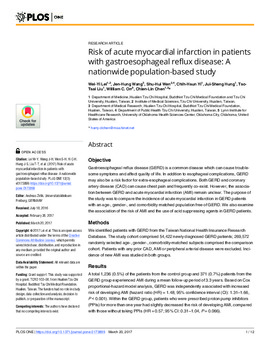| dc.contributor.author | Wei-Yi Lei | |
| dc.contributor.author | Jen-Hung Wang | |
| dc.contributor.author | Shu-Hui Wen | |
| dc.contributor.author | Chih-Hsun Yi | |
| dc.contributor.author | Jui-Sheng Hung | |
| dc.contributor.author | Tso-Tsai Liu | |
| dc.contributor.author | William C. Orr | |
| dc.contributor.author | Chien-Lin Chen | |
| dc.date.accessioned | 2017-04-10T23:19:05Z | |
| dc.date.available | 2017-04-10T23:19:05Z | |
| dc.date.issued | 2017-03-20 | |
| dc.identifier.citation | Lei W-Y, Wang J-H, Wen S-H, Yi C-H, Hung J-S, Liu T-T, et al. (2017) Risk of acute myocardial infarction in patients with gastroesophageal reflux disease: A nationwide population-based study. PLoS ONE 12(3): e0173899. doi:10.1371/journal.pone.0173899 | en_US |
| dc.identifier.uri | https://hdl.handle.net/11244/50428 | |
| dc.description | | en_US |
| dc.description | | en_US |
| dc.description.abstract | Objective Gastroesophageal reflux disease (GERD) is a common disease which can cause troublesome symptoms and affect quality of life. In addition to esophageal complications, GERD may also be a risk factor for extra-esophageal complications. Both GERD and coronary artery disease (CAD) can cause chest pain and frequently co-exist. However, the association between GERD and acute myocardial infarction (AMI) remain unclear. The purpose of the study was to compare the incidence of acute myocardial infarction in GERD patients with an age-, gender-, and comorbidity matched population free of GERD. We also examine the association of the risk of AMI and the use of acid suppressing agents in GERD patients. Methods We identified patients with GERD from the Taiwan National Health Insurance Research Database. The study cohort comprised 54,422 newly diagnosed GERD patients; 269,572 randomly selected age-, gender-, comorbidity-matched subjects comprised the comparison cohort. Patients with any prior CAD, AMI or peripheral arterial disease were excluded. Incidence of new AMI was studied in both groups. Results A total 1,236 (0.5%) of the patients from the control group and 371 (0.7%) patients from the GERD group experienced AMI during a mean follow-up period of 3.3 years. Based on Cox proportional-hazard model analysis, GERD was independently associated with increased risk of developing AMI (hazard ratio (HR) = 1.48; 95% confidence interval (CI): 1.31–1.66, P < 0.001). Within the GERD group, patients who were prescribed proton pump inhibitors (PPIs) for more than one year had slightly decreased the risk of developing AMI, compared with those without taking PPIs (HR = 0.57; 95% CI: 0.31–1.04, P = 0.066). Conclusions This large population-based study demonstrates an association between GERD and future development of AMI, however, PPIs use only achieved marginal significance in reducing the occurrence of AMI in GERD patients. Further prospective studies are needed to evaluate whether anti-reflux medication may reduce the occurrence of acute ischemic event in GERD patients. | en_US |
| dc.language.iso | en_US | en_US |
| dc.publisher | PLos One | |
| dc.relation.ispartofseries | PLoS ONE 12(3): e0173899 | |
| dc.relation.uri | http://www.plosone.org/article/info%3Adoi%2F10.1371%2Fjournal.pone.0173899 | |
| dc.rights | Attribution 3.0 United States | |
| dc.rights.uri | https://creativecommons.org/licenses/by/3.0/us/ | |
| dc.subject | Myocardial infarction,Coronary heart disease,Diabetes mellitus,Health insurance,Receptor antagonist therapy,Taiwan,Endoscopy,Hypertension | en_US |
| dc.title | Risk of acute myocardial infarction in patients with gastroesophageal reflux disease: A nationwide population-based study | en_US |
| dc.type | Research Article | en_US |
| dc.description.peerreview | Yes | en_US |
| dc.description.peerreviewnotes | http://www.plosone.org/static/editorial#peer | en_US |
| dc.identifier.doi | 10.1371/journal.pone.0173899 | en_US |
| dc.rights.requestable | false | en_US |

